Home |
Contents |
Photos |
News |
Reviews |
Store |
Forum |
ICI |
Educators |
Fans |
Contests |
Help |
FAQ |
Info


Patriotism Means Asking Questions
(4/5/02)
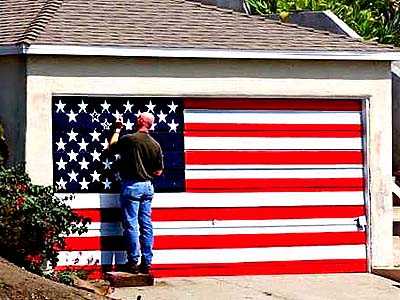
All the armies of Europe, Asia and Africa combined, with all the treasure of the earth (our own excepted) in their military chest; with a Buonaparte for a commander, could not by force, take a drink from the Ohio, or make a track on the Blue Ridge, in a trial of a thousand years. At what point then is the approach of danger to be expected? I answer, if it ever reach us, it must spring up amongst us. It cannot come from abroad. If destruction be our lot, we must ourselves be its author and finisher.
Abraham Lincoln, Address Before the Young Men's Lyceum of Springfield, Illinois, January 27, 1838
*****
Continuing the analysis of the 9/11/01 terrorist attack on America. The following picks up where The Last Refuge of a Scoundrel left off.
Some Americans get it
"Although there are undoubtedly exceptions," wrote Ward Churchill in Some People Push Back: On the Justice of Roosting Chickens, "Americans for the most part still don't get it." More on the subject from the LA Times, 9/18/01:
For Some, an Unflagging Discomfort About Flying the Stars and Stripes
Old Glory betokens patriotism for many, but Rambo-style jingoism for others.
By MARTIN MILLER and GINA PICCALO, TIMES STAFF WRITERS
Earl Katz marched on Washington to protest the Vietnam War in the 1960s. The 59-year-old philanthropist even raised funds for a Jane Fonda documentary in which more than 100 American war veterans confessed to atrocities in the southeast Asian conflict. On Wednesday, he raised an American flag outside his Marina del Rey home.
"I was a patriot then and I'm a patriot now," said Katz. "The flag represents the best of what America can be. It's not a right-wing symbol."
Roger Lowenstein, a patriot too, disagrees. Lowenstein is not flying an American flag. Nor will he. "I grew up suspicious of the flag," said the 58-year-old educator from Los Angeles who also protested against the Vietnam War. "It meant right-wing politics. It meant repression. It meant arrogance. It meant, 'We're the greatest."' In the wake of Tuesday's terrorist attacks, many Americans have rallied around or stood in line for the Stars and Stripes. A stark example: Within 48 hours of the crashes, Kmart sold 200,000 American flags, dwarfing sales for the same two days in the previous year. Other retailers have reported equally dramatic sales. American patriotism's most recognizable emblem is suddenly everywhere—on shirt lapels, car antennas, homes, roadways, bridges, and draped from buildings.
Among the flag wavers is John Keaveney, 52, who served two tours of duty in Vietnam and now runs an L.A. nonprofit group that serves homeless veterans. American flags adorn walls, parked trucks and office doors all over Keaveney's office. "I wore my flag tie yesterday," he said "And I'm sleeping with my flag pajamas on."
For other Americans, deciding whether to display the flag hasn't been so simple. On one hand, they want to show solidarity with Americans affected by the tragedy, but they don't want to appear jingoistic. Some fear an excessive display of flags means an implicit endorsement of war.
"I feel confused and disconnected [from the flag]," said Jodie Evans, a 47-year-old Venice political activist. "Haven't people learned anything in the last 30 years? Haven't they been watching what America has been doing around the world? Instead of feeling humility and compassion, it seems like the flag is being flown to just arrogantly continue what we've been doing."
Ira Glass, 42-year-old Chicago-based host of Public Radio International's "This American Life," is struggling with the issue. "The first day [after the attacks], it felt like waving a flag was an act of mourning," he said. "But now that we're going to war ... waving a flag feels like giving carte blanche to Congress and the president to do whatever. And I don't believe that." Nonetheless, Glass said, he has warned his girlfriend, who is Arab American and lives on Chicago's North Side, that she ought to put up a flag since the other houses on her block are displaying them.
Some are making a compromise of sorts. Troubled by the nationalistic implications of red, white and blue, activist Barbara Dority of Seattle placed a white ribbon on a tree outside her house as a symbol of peace.
"I love my country," said Dority, 52, executive director of the Washington Coalition Against Censorship. "Nothing allows people to commit atrocities more than the belief that God is on their side and that's what we're seeing here."
.
.
.
Just as the meaning behind the flag has changed since the Vietnam War when it was more identified with war support than dissent, so too it may change again. Now, the flag is experiencing a kind of honeymoon period, during which its display is thrilling and consoling. That includes not only the big cities and small towns of America, but a surprising number of countries around the globe.
If the American government's response to the events of last Tuesday is deemed too drastic and harsh, however, the chance always exists that the flag may become a negative symbol. "If we engage in Rambo tactics," said Nackenoff. "We may see the flag evolve into a symbol of hostility. And instead of public expressions of support and sympathy from around globe, we may see people burning the American flag in the streets."
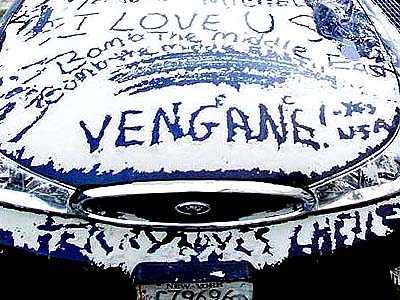
Comment: Poor Ira Glass and his Arab American girlfriend. Heaven forbid that any American doesn't proclaim "my country, right or wrong" in times of trouble. Anglo Americans risk getting lectures or insults if they take a stand against war. Arab Americans risk getting beat or killed.
Whether at home or abroad, America's attitude is "my way or the highway"..."like it or lump it"..."I'm right and you're not."
Patriotism means dissent
From the LA Times, 10/23/01:
COMMENTARY
A True Patriot Can Pose Hard Questions
By ROBERT SCHEER
Robert Scheer writes a syndicated column
War skeptics such as Richard Gere, Susan Sontag, Rep. Barbara Lee (D-Oakland), Bill Maher and the Berkeley City Council should be congratulated, not vilified, for daring to demur, ever so slightly, from government propaganda. Right or wrong, they have acted as free people in a free society who understand that if our course is correct, it can survive criticism. And if it is not, it is all the more important that we gather the courage to state that criticism clearly and in a timely fashion.
It's shocking that so few have raised doubts and that the ones who have are called wimps, traitors and worse, with their lives threatened by cowards hiding behind anonymous letters and phone calls. It is no badge of courage to blindly accept the actions taken in our name by our government.
Let me be clear: Terrorism as exemplified by the murders of Sept. 11 and the anthrax scare that has followed needs to be stopped, fast and efficiently. However, there is no blueprint for accomplishing that, and as a free, self-ruling democratic people, it is not only our right but our responsibility to vigorously and openly debate the issues: the use of military force, our foreign policy, civil rights and privacy in a time of war, and so on. "America Unites" sounds great as a news logo, but unity is no simple concept. We all want our families, our soldiers, our unions, our sports teams to be united toward clear, common goals. But is it not dangerous for a democratic populace weighing if and how to wage war to value unity above all else? It's all too easy to mandate patriotism, as the New York Board of Education did last week, bringing back the pledge of allegiance to classrooms as if that will stop the Osama bin Ladens of the world.
To understand the limits of government-sponsored "unity," we might ask the soldiers of the old Soviet Union. They marched with their pledges and anthems into the treacherous terrain of Afghanistan two decades ago, while at home the dissent that could have saved them from military and economic disaster was systematically squelched.
Authoritarian societies inevitably crumble because they silence the critics who could save them from the errors of blind hubris. Dissent is not a luxury to be indulged in the best of times but rather an obligation of free people, particularly when the very notion of dissent is unpopular. This is why our nation's founders enshrined the Bill of Rights, within a few years of fighting a revolution in which one-third of their compatriots were sympathetic to the British king. They were painfully aware of the inconvenience of dissent to those who govern—even in times of war—but they valued it as essential to democracy.
The U.S. Supreme Court clearly understood this when it ruled that mandatory recitation of the pledge of allegiance—even before the divisive words "under God" were inserted—was unconstitutional. "To believe that patriotism will not flourish if patriotic ceremonies are voluntary and spontaneous instead of a compulsory routine is to make an unflattering estimate of the appeal of our institutions to free minds," wrote Justice Robert H. Jackson for the majority in 1943. This was, remember, at the height of World War II, when the war's outcome was very much in doubt.
If we discourage dissent now, we will give terrorists the victory they sought by destroying what they most hate about our society: its commitment to unfettered thought and expression. And if we who have hard questions about the path our leaders are taking don't speak up, we may be party to a more tangible defeat: a continuing erosion of security in a divided world we don't always seem to understand.
And from the LA Times, 11/11/01:
DEMOCRACY
Patriotism Demands Questioning Authority
By TODD GITLIN
Todd Gitlin is professor of culture, journalism and sociology at New York University.
NEW YORK — Years ago, a student of mine at UC Santa Cruz drove a Volkswagen van with a QUESTION AUTHORITY bumper sticker. One day, somebody scratched out the message. Lately, at a time when some people think loyalty must be demonstrated with a shut mouth, I've been thinking of my former student and her anonymous vandal.
Whoever felt the need to crush that young woman's audacity was stomping on democratic ideals, failing to understand that questioning is precisely what authority needs. In a democracy, authority needs to convince those it governs. To be convincing, it must be willing and able to defend itself, even—especially—when pointed questions are asked. In his essay "On Liberty," John Stuart Mill wrote that even if one and only one person dissented, the dissent should be heard. First, because the dissenter might just be right. Second, because the authority of the majority opinion—even if close to unanimous—can only be bolstered by having to confront its adversaries. Amid free discussion, arguments only improve. So the expression of rival views is necessary for practical as well as principled reasons. But during the current emergency, a stampede of unthinking censure is muffling the debate we need to have in order to fight the smartest possible campaign against our enemies. Ari Fleischer, the president's press secretary, scolded that Americans should "watch what they say." He was not referring to advance notice of troop movements, which of course no one ought to blurt out. He was referring to a tossed-off remark by talk show host Bill Maher. And Fleischer is not alone in blindly discarding the democratic faith in free discussion. In the Wall Street Journal last week, Gregg Easterbrook wrote that, since novelists Barbara Kingsolver and Arundhati Roy have written harshly about the American flag and America's approach to the world, "bookstores may fairly respond by declining to stock their books." Stocking their books, he suggests, amounts to "promoting" their views.
As it happens, I have written passionately against Roy's views in recent weeks, and I vigorously disagree with Kingsolver about the flag. What does their wrong-headedness have to do with their right to be read? As it happens, Easterbrook himself wrote recently in The New Republic that American motorists contribute handsomely via oil imports to the Saudi Arabian money gusher that has subsidized Al Qaeda. Should gas-guzzling patrons of Barnes & Noble be catered to if they demand that his book be unshelved?
A call for the shuttering of minds betrays the opposite of confidence in the American campaign against murderous terrorists. What it betrays is desperation, feebleness of nerve, a pathetic lack of confidence that questions can be answered. If our authorities are already unthinkingly, kneejerkingly disbelieved by too many people around the world, why does it help to ask fewer questions? The quandaries we confront now—and for the foreseeable future—are immensely difficult, surely making the asking of questions a citizen's duty.
Yet, since Sept. 11 and the decision to go to war in Afghanistan, public officials are taking easy ways out, resorting to platitudes. Democrats and Republicans alike are fearful of vigorous public debate. Faced with a colossal failure of intelligence before Sept. 11, such blank-check confidence in the institutions of national defense is demonstrably foolhardy. Much of the press, particularly television, had deluded itself in recent years that America could afford to ignore international events. Now they are playing catch-up, but timidly. Reporters ask technical military questions that officials properly dance away from, but they shy away from bigger, more important political questions.
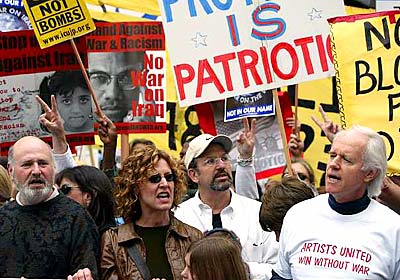
Now the national self-defense campaign has turned into a war. And war, like it or not, mangles the truth, because propaganda is useful to all parties. The Pentagon can't be expected to change its ways. All the more reason, then, for journalists on other beats to give ample attention to the immense questions before us. One need not make the mistake of thinking that Afghanistan is Vietnam to note that policy unquestioned is policy unbridled.
Our questions need to start with one so basic and difficult it needs to be reflected upon calmly, again and again. How is America to live in a world where hundreds of millions of ignorant people, some of whom aim to possess weapons of mass destruction, hate us? From that question will come dozens of others, including:
* What ought to be American policy toward the fundamentalist Islamic regime of Saudi Arabia, which nurtured Bin Laden, the Taliban and the fanatical madrassas of Pakistan? If it is time to stop America's long embrace of the House of Saud, then what? If our need to embrace the Saudi regime in part stems from our dependence on oil, then how can we reduce it?
* What is the danger of famine this winter in Afghanistan? What is the U.N. saying? (Warnings and appeals by Oxfam, the Red Cross and other relief groups have barely registered on the American radar screen.) Who is to be trusted about casualties, famine and other desperate conditions there? The Taliban is trying to manage the news—big surprise. But casualty reports, true or false, are flying around the rest of the world. What is the rest of the world saying? Why are American editors not sifting through these reports, evaluating them as best they can and pulling out the most reliable for Americans?
* Are sanctions against Iraq useful? Are they having the desired effect? How else might we restrain Saddam Hussein's weapons programs and assaults on his own people?
The sad truth is that, when deciding what constitutes legitimate controversy, the media take their cues from the two major parties. When the parties agree to keep a question out of play, the news media usually acquiesce, as with the elimination of debate on the president's missile defense system in the wake of Sept. 11. In those days, with huge questions unasked and unanswered, we saw an unseemly haste on both right and left to stake out firm positions on a war without clear aims.
In the meantime, those who oppose the current war also evade tough questions. If they oppose the bombing, how do they propose that the nation defend itself? By parachuting subpoenas over Afghan caves? Nothing could be emptier than to say "Bring Bin Laden to justice" when there is no international constabulary, no international army, no international criminal justice system. Today and tomorrow, in the only world we have, how is the government to protect Americans from committed murderers who unrepentantly say they want to kill Americans anywhere and have demonstrated their ability to do so? No American government could deserve respect from its own citizens without a plausible strategy in the here-and-now.
Barry Farber, a long-time conservative radio host in New York, had it right. He used to close his show with the words, "Keep asking questions." That was patriotism, not panic.
Copyright 2001 Los Angeles Times
Comment: The answer to Gitlin's question for those who oppose war is obvious. We oppose these criminals the way we've always opposed criminals—whether it's South Africa's apartheid regime, the Nazis who fled Germany, or OJ Simpson. Namely, we pursue them, surround them, and force them to surrender. This approach has worked in countless cases large and small throughout history. It's working in this case too.
See Diplomacy Works, Violence Doesn't and What Happened: Results of the So-Called War for more on the subject.
In contrast, bombing Afghanistan hasn't resulted in the capture or death of those who planned 9/11. It hasn't done much to reduce terrorism worldwide or prevent Al Qaeda from planning revenge. Rather than ask peace advocates how they'd defend the country by some means other than bombing, we should ask the warmongers how bombing defended the country. Where's the proof that scattering Al Qaeda did anything to safeguard our borders or make up for the innocent Afghans killed?
Peace advocates haven't evaded Gitlin's question. As he rightly notes, warmongers have evaded ours. Why war after only 26 days, without giving diplomacy a chance? How has bombing Taliban soldiers and creating Afghan refugees brought a single terrorist to justice? How will destroying Afghanistan prevent future terrorism like the 9/11 attacks, which were staged from the US and Germany?
I agree Bush's call to "bring Bin Laden to justice" (dead or alive) was empty rhetoric, especially since he also opposes the international justice system that would achieve the most satisfactory results against Bin Laden. But peace advocates such as Barbara Kingsolver advocated more than just bringing Bin Laden to justice and were willing to rely on international mechanisms to ensure justice for anyone captured. Whichever straw man Gitlin thinks he's arguing against, it isn't the position of the typical peace advocate.
Leading Americans explain what patriotism really is
The true patriot ... will enquire into the causes of the fears and jealousies of his countrymen; and if he finds they are not groundless, he will be far from endeavoring to allay or stifle them. On the contrary, he will by all proper means in his power foment and cherish them. He will, as far as he is able, keep the attention of his fellow citizens awake to their grievances; and not suffer them to be at rest, till the causes of their just complaints are removed.
Samuel Adams, essay in the Boston Gazette, 1771
Each must for himself alone decide what is right and what is wrong, and which course is patriotic and which isn't. You cannot shirk this and be a man. To decide it against your convictions is to be an unqualified and inexcusable traitor, both to yourself and to your country, let man label you as they may. If you alone of all the nation shall decide one way, and that way be the right way according to your convictions of the right, you have done your duty by yourself and by your country—hold up your head! You have nothing to be ashamed of.
Mark Twain, Papers of the Adam Family, c. 1900
Patriotism means to stand by the country. It does not mean to stand by the president or any other public official save exactly to the degree in which he himself stands by the country. It is patriotic to support him insofar as he efficiently serves the country. It is unpatriotic not to oppose him to the exact extent that by inefficiency or otherwise he fails in his duty to stand by the country.
President Theodore Roosevelt, 1908
Indeed, conceit, arrogance, and egotism are the essentials of patriotism. Let me illustrate. Patriotism assumes that our globe is divided into little spots, each one surrounded by an iron gate. Those who have had the fortune of being born on some particular spot, consider themselves better, nobler, grander, more intelligent than the living beings inhabiting any other spot.
Emma Goldman, speech, 1911
The notion that a radical is one who hates his country is naive and usually idiotic. He is, more likely, one who likes his country more than the rest of us, and is thus more disturbed than the rest of us when he sees it debauched. He is not a bad citizen turning to crime; he is a good citizen driven to despair.
H.L. Mencken, Prejudices, 1919
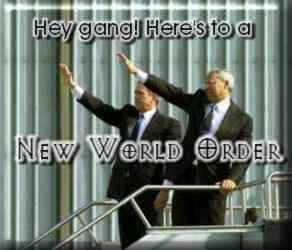
He who joyfully marches to music in rank and file has already earned my contempt. He has been given a large brain by mistake, since for him the spinal cord would fully suffice. This disgrace to civilization should be done away with at once. Heroism at command, senseless brutality, deplorable patriotism, how violently I hate all this.
Albert Einstein, Ideas and Opinions, 1954
Ask not what your country can do for you, but what you can do for your country.
President John Fitzgerald Kennedy, inaugural address, 1961
No matter that patriotism is too often the refuge of scoundrels. Dissent, rebellion, and all-around hell-raising remain the true duty of patriots.
Barbara Ehrenreich, The Worst Years of Our Lives, 1991
More thoughts on American patriotism
Flags, flags everywhere. This is not a Lakers, Sparks, Galaxy or Dodgers game. Our fight against terrorism is not merely a spectacle to watch on television and root for a "winner." This is war. I wonder if those who have clipped American flags to their cars fully realize the implication of what that means. I wonder if they will be willing to participate in the war by signing up to fight in Afghanistan.
As our fight against Osama bin Laden and his terrorist cells continues, most likely for years, will Americans still wave flags from their vehicles? Or will we see more and more small flags on the side of the freeway, gathering dust and grime from the passing cars?
Francien Rohrbacher, letter, LA Times, 9/24/01
The wave of citizens purchasing U.S. flags in the aftermath of the recent terrorist attacks is certainly a warm and fuzzy story (Sept. 14). Will these "patriots" also be willing to get rid of their gas-guzzling SUVs—which perpetuate the United States' dependence on Arab oil? I doubt it. That would undoubtedly be too great a sacrifice. It's much easier to buy a flag.
Aaron Friedland, letter, LA Times, 9/18/01
Suddenly, there are many giant sport-utility cars patriotically affixed with American flags. Gas guzzlers and other wasteful energy-use practices are primary reasons why we are in this "war." Real patriots demand and purchase energy-efficient vehicles and technologies. Doubling mileage standards could alone free us of "evil" Mideast oil. Patriots look past our Afghanistan war dance and demand long-term solutions. Consumers, not patriots, drive guzzlers.
Larry Wilco, letter, LA Times, 9/23/01
SUVs flying American flags are an oxymoron. There's nothing patriotic about the arrogance and ignorance that go into driving one of these anti-environmental monsters. We openly waste precious natural resources in front of a world that has too few of them. We tell the world that it's our perfect right to pollute the planet as much as we wish. Much of the petroleum that powers these SUVs comes from less-than-friendly places. Do us proud: Park your SUV in the garage and fly your flag from your house.
Lloyd A. Cunningham, letter, LA Times, 10/6/01
A patriot is not someone who displays the American flag, wears ribbons or sings "God Bless America." A patriot is someone who votes in elections (federal, state, county and local), pays taxes, registers for the draft and obeys the law (including immigration, drug and traffic laws). Displaying patriotism is easy; being a patriot requires strength. I applaud all the patriots in L.A.'s 4th Council District who voted on Sept. 11. They sent a stronger message to our enemies than any flag could have sent.
Philip I. Provencio, letter, LA Times, 9/22/01
Q: In the days following the vote, you were discussed widely on talk radio. People called you a traitor. They called you un-American and an accomplice of the terrorists. How do your respond to charges like that?
A: It's very painful, because I feel I'm just the opposite. I am an American who has tried to protect our democracy, who has tried to protect our system of checks and balances. If I hadn't, in the moment of adversity, tried to make sure that our Constitution stayed in place, that would have been an abdication of my responsibility as an American citizen and as a representative. Many people misinterpreted my vote. Many simply believe that when you disagree, you are a traitor. But I say, when you disagree, you are demonstrating the beauty of this democratic system. And that's the true American way. I want to bring the perpetrators to justice, and I want to see a peaceful world.
Interview with Barbara Lee, who voted against giving Bush war authority, in the LA Times, 9/23/01
I find it appalling that in America, the land of the free, those of us who have dissenting opinions from the majority are often subject to outrageous allegations, many of which go unchallenged. As a proud American citizen, I resent the notion that I should not question my government's actions. Dissent is a fundamental right we have in America. I resent the attempt of self-appointed patriots to censor me and others who believe that war is not the answer to this crisis.
Rahul K. Sivaprasad, letter, LA Times, 10/3/01
I am so tired of hearing "this is a time for unity." These people might as well say "end of discussion." Is this really the most patriotic way of responding to the biggest decision with which this country has ever been faced? With the worldwide proliferation of nuclear and biological weapons, our days of fighting small, polite, well-contained wars are over. This doesn't warrant some discussion and consideration of alternatives?
Let's agree on how we are united. We are united in our mourning, our fears, in our disdain for terrorism and, yes, we are even united in wanting to be united. The concerns that challenge our unity are: what the cause of terrorism is; how to solve the problem of terrorism; whether it is necessary to figure out the cause before we can figure out the solution. Let's stop the rhetoric and address this problem as we would any other by talking, listening, reading and doing our homework.
Kelly Moreland, letter, LA Times, 10/6/01
After "Why?" the most frequently asked question about this tragedy is "How can I help?" Those of us far from the scenes of devastation sent money to charities and donated blood. But the ways to help our country will involve continuing commitment.
Read: Learn about the political situation in the Middle East. It's no longer an option to be uninformed.
Vote: We have an obligation to make sure that government policy reflects the will of the people.
Think globally, act locally: Find ways to contribute in your own community. The great melting pot of Los Angeles offers plenty of opportunities to strengthen our democracy.
Cynthia J. Friedlob, letter, LA Times, 9/22/01
Riding my bike through Brentwood, I observed the driver of a luxury sedan open his door and toss out a dirty towel. I caught up with him at the next intersection and asked him about it. He replied that he didn't want it anymore. I suggested that it was a disrespectful act and that he should go pick it up. He responded with the most common of expletives, told me to go pick it up and roared away.
He had an American flag attached to his window. The last time I checked, patriotism was defined by love, support and defense of one's country. Is it possible that this "gentleman's" simple, degrading act is a troubling indicator of our national psyche? Have we become so belligerent that we don't even respect our own homeland, not to mention other nations? If this is the case, we are probably due for many rude awakenings.
Randolph Paik, letter, LA Times, 9/28/01
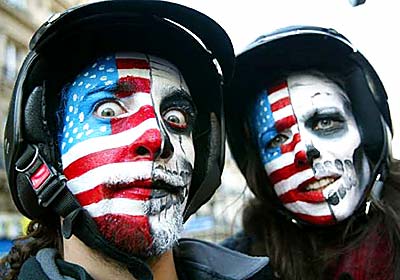
Last Sunday I saw a shiny black Mercedes sporting a big, bright American flag and I thought: That's awesome.
Then the driver proceeded to lean on her horn, unleash a spate of unprintable curse words and give the mighty "finger" to a car that had meandered into her lane.
Hey, Miss America, this is patriotism? How about showing a little bit of that American spirit here on the home turf?
Willie Dreyfus, letter, LA Times, 9/29/01
The vultures who are selling American flags at curbside locations should be ashamed. They are profiting off the tragedy that hit our country.
The flags they are selling for $20 each can be purchased for $7 at numerous retailers, when available. Please do not purchase flags from these crooks. Send $20 to a charity for attack victims instead. I did.
Ron Oliver, letter, LA Times, 9/29/01
Perhaps overcome by feelings of patriotism after the recent national tragedies, I hope whoever appropriated the American flag from my front lawn is now waving it with pride.
Enrique Teves, letter, LA Times, 9/21/01
Patriots of America, unite!
I wrote the following letter to the LA Times, 9/24/01:
"Any kind of partisan activity is totally inappropriate during this period," said Howard Wolfson, a New Yorker who heads campaign operations for House Democrats. "Inappropriate, unpatriotic and unwelcome." (LA Times, 9/23/01)
I totally agree. We must stop the divisive backbiting and criticism and present a united front against terrorism.
If everyone will just agree with my positions and get behind me, we can finally begin moving forward.
Related links
More on the value of criticism
America's exceptional values
Winning through nonviolence
America's cultural mindset
Readers respond
"Real" Americans wish dissenters would "get f—king AIDS and die you liberal pussy faggot traitors."
* More opinions *
|
|
. . .
|

|
Home |
Contents |
Photos |
News |
Reviews |
Store |
Forum |
ICI |
Educators |
Fans |
Contests |
Help |
FAQ |
Info
All material © copyright its original owners, except where noted.
Original text and pictures © copyright 2007 by Robert Schmidt.
Copyrighted material is posted under the Fair Use provision of the Copyright Act,
which allows copying for nonprofit educational uses including criticism and commentary.
Comments sent to the publisher become the property of Blue Corn Comics
and may be used in other postings without permission.





